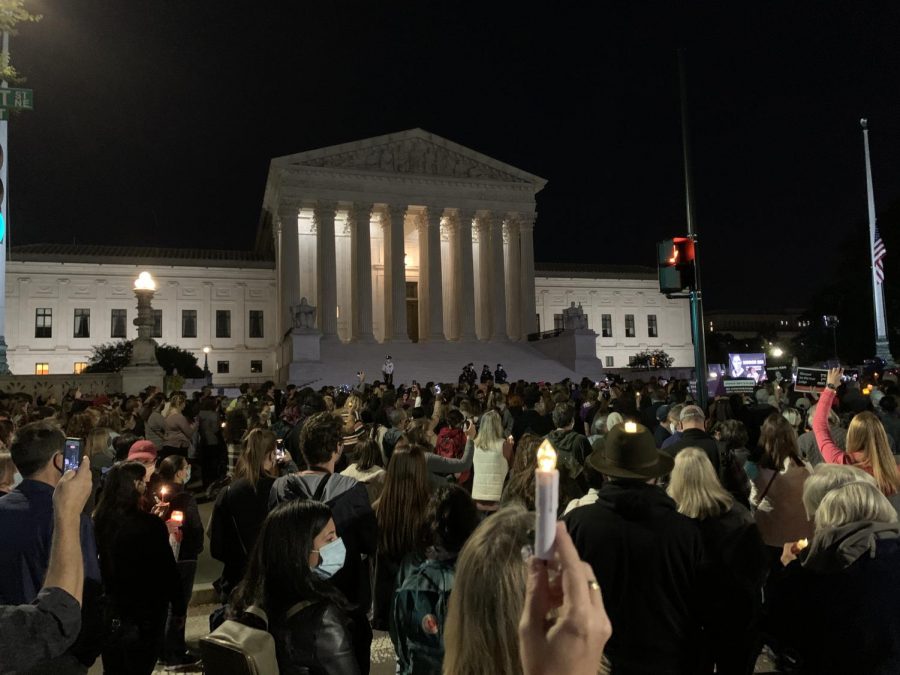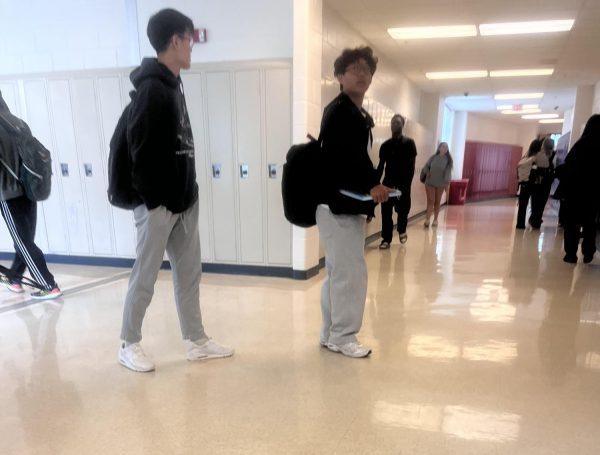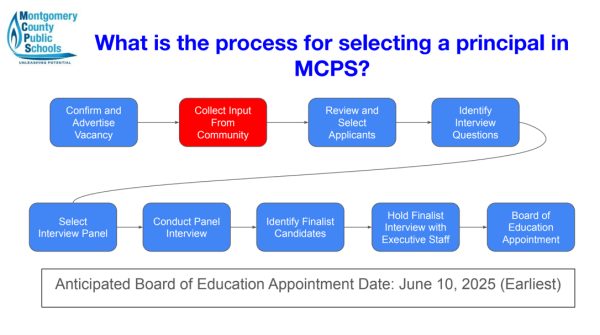Student-lead advocacy groups urge Senate against Supreme Court nomination before next year
A large crowd gathers in front of the Supreme Court the night of Sep. 19 for a candle-lit vigil in honor of the late Justice Ruth Bader Ginsburg.
After the passing of renowned Supreme Court Justice Ruth Bader Ginsburg on Sep. 8, the Senate has (despite contradictory precedent) begun to rush a new, conservative nomination to fill her place, causing outcry and objection from progressive activists.
Ginsburg’s death has been a devastating blow for the United States, especially women, minorities and people of color, members of the LGBTQ+ community, and young people. A justice appointment from the Senate, less than one month before the general election, would mean a 6 to 3 conservative majority, tipping the scale and opening the doors toward the undoing of Justice Ginsburg’s rulings, such as Obergefell v. Hodges, the 2015 marriage equality decision.
Progressive activists are determined to stop the Senate from seeing this nomination through, quoting both Ginsburg’s dying wish that her seat not be replaced until after the next presidential inauguration and the fact that the Senate blocked President Barack Obama’s 2016 nomination because it was an election year. On the local level, student-led organizations in Montgomery County are stepping up and doing all they can to prevent an appointment from the Senate before next year.
One example of such an organization is GenERAtion Ratify. The primary goal of this youth-lead group is the ratification of the Equal Rights Amendment, but it also focuses on a wide range of gender equality and equity issues, making sure that they—and all matters intersecting—are addressed.
With regards to the Supreme Court, GenERAtion Ratify has had advocacy forms (online signup forms where people can enter their name and little bit about them) that send 10-15 automated emails to swing Republican senators, as well as Republican senators on the Judiciary Committee who are in tight races with their Democratic opponents. The group has also given students the opportunity to phone bank, or to call people across the country and urge them to ask their senators to vote against a nomination.
The hope with the former is that, “Because of this election, because of the climate of the Senate, [certain Republican senators] are in really tight races with their Democratic challengers, so that plays a huge role into their decision now. So if a bunch of people are calling on them to vote against this Supreme Court nomination, what we hope is that they will be under the pressure of the election and sway a little bit in order to make sure [they are reelected],” Clarksburg junior and GenERAtion Ratify Maryland state director Nikhitha Balijepalli said.
Another student-run organization fighting against a Supreme Court nomination before the election is Moco For Change. This organization began after the Parkland shooting in 2018, starting out as a group of passionate students that advocated for gun control and reform, and later broadening its focus, advocating for equitable education and youth civic engagement.
“With the ongoing issue of the SCOTUS nominations, MoCo For Change is committed to fighting for the people and our democracy. Through phone banking efforts, artivism, increasing awareness, and other legislative advocacy efforts, we are doing everything in our ability to influence officials and extend the nominations past the 2020 elections,” Northwest sophomore Maahe Kunvar said. Kunvar is running Moco For Change’s SCOTUS projects.
These two organizations (and others) are proving that nobody is too young to fight for what they believe in. America’s youngest generations are standing up and fighting for their futures, whether that be by marching, rallying, and protesting, or by phone banking people locally and around the country.
Young activists have the capability to inspire change on the national level. “People really undermine the power youth advocacy groups have in general. There are so many ways students affect national government and national policy. One of the most powerful ways is hosting demonstrations, doing banner drops, getting a lot of press around you and making a statement about something that you care about. When high ranking national leaders are able to see that, they will know that this is something that people care about. As soon as they know that, and people around the world know that, it will be on the news and it will be a topic that people talk and debate about,” Balijepalli said.
One of the reasons so many young people have begun standing up to fight for what they believe in is because the decisions made in the government today determine what kind of future they will grow up to live in. “Although there are many other effective forms of activism, I believe that youth voices are extremely impactful and powerful in our current climate. We are the generations that are going to grow and live with the decisions that are being made in our country. We are the demographic that will be most affected by those changes, and youth activists rallying together has influenced change at the state and national levels, whether it involves climate change, gun reform, or Supreme Court Nominations,” Kunvar said.
If you would like to contact senators or know somebody who would, visit generationratify.org/scotus for a list of points of contact.
Your donation will support the student journalists of Thomas S. Wootton High School. Your contribution will allow us to purchase equipment and cover our annual website hosting costs.
Nico DePalma is a 2022 graduate.








Hydronaut01 • Oct 21, 2020 at 8:52 pm
Nice article . Very informative .